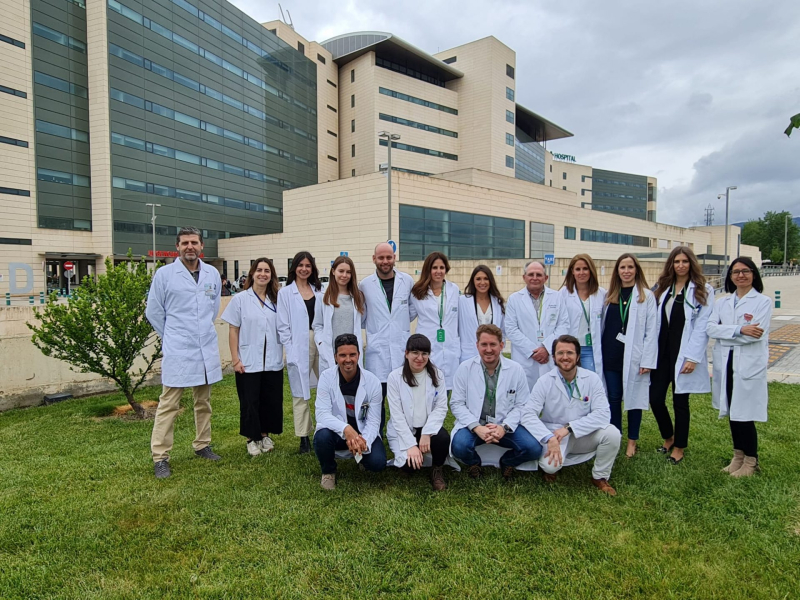
A study carried out by the MP20-Biomarkers of Metabolic and Bone Diseases research group at the Biohealth Research Institute in Granada (ibs.GRANADA), led by UGR Professor Manuel Muñoz Torres, has provided significant insights into the role of sclerostin in protecting against atherosclerosis in patients with type 2 diabetes.
Sclerostin, commonly associated with the regulation of bone formation, has emerged as a protective factor in vascular health, especially in individuals with type 2 diabetes. Atherosclerosis, a common complication of this disease, involves the deposition of substances such as cholesterol and fats in the arteries, resulting in the formation of plaques that can reduce blood flow and increase the risk of serious cardiovascular diseases.
The study, led by Professor Manuel Muñoz Torres, together with Dr Beatriz García Fontana and Dr Cristina García Fontana, included 121 controls and 139 patients with type 2 diabetes (48 with cardiovascular disease and 91 without). The results showed significantly higher levels of sclerostin in patients with type 2 diabetes and cardiovascular disease, suggesting a possible link between this protein and atherosclerosis. Sclerostin was also shown to play a beneficial role in reducing arterial calcification, which is associated with the development of atherosclerosis.
The group of scientists from ibs.GRANADA, the “San Cecilio” University Hospital in Granada, the Centre for Networked Biomedical Research on Frailty and Healthy Ageing (CIBERFES) of the “Carlos III” Health Institute, as well as the UGR, carried out in vitro experiments on vascular smooth muscle cells, replicating pathophysiological conditions of patients with type 2 diabetes. They found that sclerostin overexpression reduced calcium deposits, decreased cell proliferation and inflammation, and promoted cell survival.
The results, part of researcher Sheila González Salvatierra’s doctoral thesis, raise concerns about the use of anti-sclerostin antibody treatments in patients with type 2 diabetes, as blocking sclerostin activity may increase cardiovascular risk. This discovery highlights the importance of following regulatory guidelines when prescribing these medications, which are contraindicated in people with high cardiovascular risk.
The authors of the study noted the clinical relevance of these findings, which have the potential to significantly impact therapeutic strategies for patients with type 2 diabetes and cardiovascular disease.
The study was funded by the Regional Government of Andalusia, the “Carlos III” Health Institute, the European Regional Development Fund, and the Centre for Networked Biomedical Research on Frailty and Healthy Ageing (CIBERFES).
About the group
The MP20-Biomarkers of Metabolic and Bone Diseases research group at ibs.GRANADA is dedicated to the identification of biomarkers and new therapeutic targets in common diseases. Their research lines cover a wide range of important areas, from the development of innovative diagnostic kits in collaboration with biotechnology companies, to clinical trials of anti-osteoporotic and anti-diabetic drugs. The group is also pioneering the use of non-invasive techniques, such as the trabecular bone score and 3D Shaper, to assess bone architecture and diagnose bone fragility at an early stage.
The group’s research also focuses on understanding the role of bone and muscle as endocrine organs and identifying molecules that potentially inhibit metabolic pathways associated with vascular complications in patients with type 2 diabetes using bioinformatics tools such as molecular docking and structural biology techniques. They also investigate genetic, hormonal and nutritional influences on bone fragility, as well as the interaction between bone fragility, diabetes mellitus and cardiovascular disease as age-related diseases. Their collaboration with prominent research networks such as CIBERFES and the Centre for Networked Biomedical Research on the Physiopathology of Obesity and Nutrition (CIBEROBN) extends their reach and contributes to significant advances in knowledge in these key areas of health.
Bibliographic reference:
González-Salvatierra S, García-Fontana C, Lacal J, Andújar-Vera F, Martínez-Heredia L, Sanabria-de la Torre R, Ferrer-Millán M, Moratalla-Aranda E, Muñoz-Torres M, García-Fontana B. Cardioprotective function of sclerostin by reducing calcium deposition, proliferation, and apoptosis in human vascular smooth muscle cells. Cardiovascular Diabetology. 2 November 2023; 22(1):301.
Contact details:
Manuel Muñoz Torres
Department of Medicine
Faculty of Medicine
Telephone: +34 958 246 124
Email: @email
Translated version: This text has been translated into English by the Language Services Unit (Vice-Rectorate for Internationalization) of the University of Granada.



